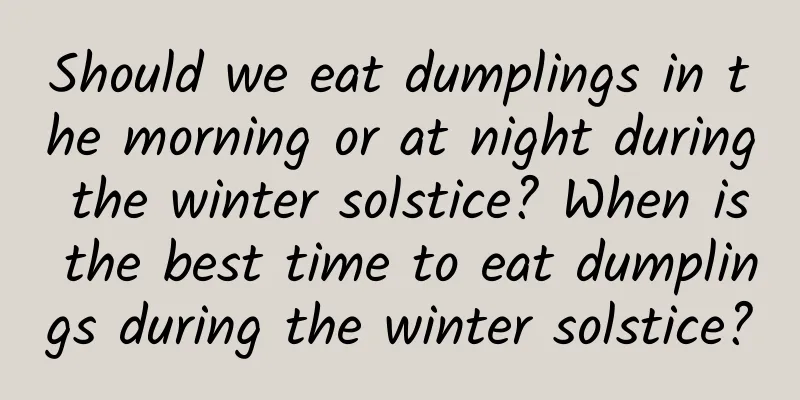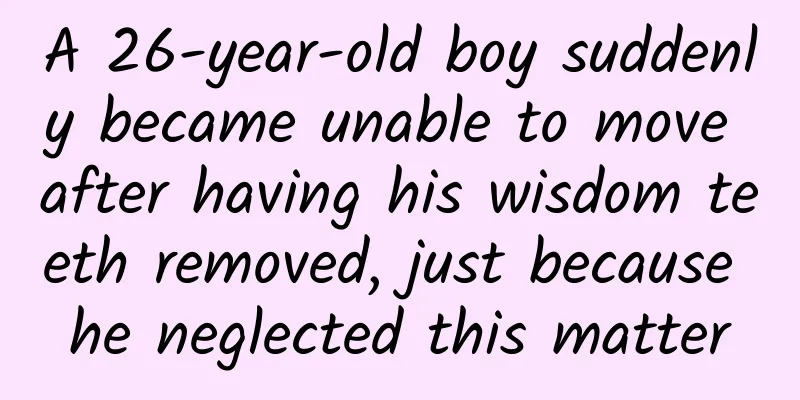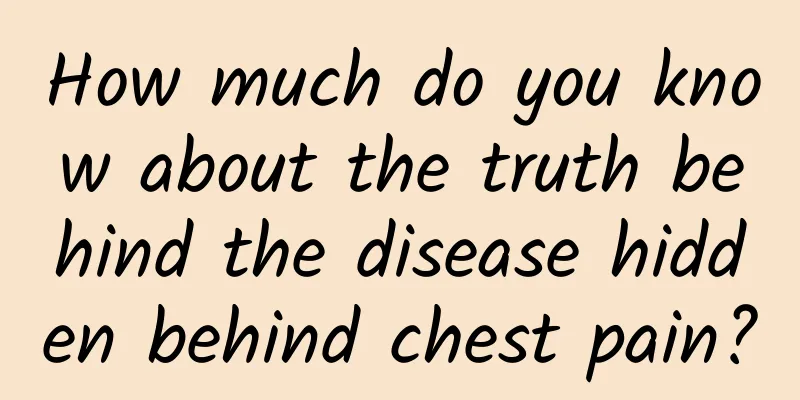Should we eat dumplings in the morning or at night during the winter solstice? When is the best time to eat dumplings during the winter solstice?

|
As we all know, the Winter Solstice is the last solar term of the year and is also a traditional day in my country. Many places have various customs, and eating dumplings is a very common custom. Many people eat dumplings during the Winter Solstice. So when is the best time to eat dumplings during the Winter Solstice? Let's take a closer look! Should we eat dumplings in the morning or in the evening during the winter solstice?You can eat dumplings in the morning or in the evening during the Winter Solstice. There is generally no time requirement. Winter Solstice is a solemn solar term for northerners. Eating a bowl of steaming dumplings in the freezing cold weather indicates good luck and health throughout the winter. Relatives and friends also exchange greetings, which adds to the atmosphere of the solar term and makes it more warm and harmonious. Northerners are famous for their love of dumplings. Dumplings are indispensable for major and minor festivals. Without dumplings, it is not a festival. Once you get used to this tradition, nothing tastes as good as dumplings. Why do we eat dumplings during the winter solstice?It is caused by the spread of traditional customs. Why do we eat dumplings on the winter solstice? There is an allusion to this. It is said that when the "Medical Saint" Zhang Zhongjing resigned from his official position and returned to his hometown, he saw many homeless people with pale faces and thin bodies, and their ears were frozen and rotten on the road. So he developed a recipe for keeping out the cold, named "Quhan Jiao'er Soup", and opened a shop on the winter solstice to give medicine to the poor. After people drank the "Jiao'er Soup", they felt warm all over and their frostbitten ears healed. This tradition has been passed down to later generations, and people call eating dumplings during the winter solstice "calming the ears" because dumplings are shaped like ears, and eating dumplings will keep your ears from getting frozen! The customs of celebrating the Winter Solstice vary from place to place. Friends in the northern regions like to make delicious dumplings on the day of the Winter Solstice, and the whole family gather together to eat dumplings happily; while in the southern regions, the custom in some places is to eat glutinous rice balls, but in Yulin, Guangxi, we don’t eat glutinous rice balls. Instead, we like to eat delicious rice dumplings on the day of the Winter Solstice. The Origin of Winter SolsticeSpeaking of the winter solstice, its origin is not small, and it can be traced back to the Zhou Dynasty three thousand years ago. Friends who are familiar with the ancient calendar will know that there was a tradition of "changing the calendar and the color of clothes" in ancient my country. In the Han Dynasty, Dong Zhongshu further summarized it and raised it to a theoretical form, and then proposed the theory of "three systems and three regularities". We will not talk about the "three systems", but let's talk about the "three regularities". The so-called "regularity" refers to the "first month". Today, we regard January as the first month, as if it has become common sense. In fact, it was not like this in ancient times. For example, the Xia Dynasty took January as the first month, so Xia Jianyin; the Shang Dynasty took December as the first month, so Shang Jianchou; the Zhou Dynasty took November as the first month, so Zhou Jianzi. In the Qin Dynasty, October was the first month. After the Han Dynasty replaced the Qin Dynasty, it denied it on a large scale and even denied the legitimacy of its regime, believing that it was the direct successor of the Zhou Dynasty. Dong Zhongshu used "three" as a cycle and established his own historical view of the three systems of black, white and red. Therefore, in the Han Dynasty, it was another cycle. Like the calendar of the Xia Dynasty, January was the first month. Since then, this calendar has been used for more than two thousand years. We usually call it the "Lunar Calendar". In fact, it has another name, the "Xia Calendar". In this way, we understand that the Zhou Dynasty took the eleventh month of the lunar calendar as the first month, and the winter solstice as the beginning of the year, that is, in the Shang Dynasty, the winter solstice was equivalent to the New Year. As recorded in the "Book of Han", "The yang energy rises on the winter solstice, and the emperor's way is long, so it is celebrated..." The "winter solstice" was clearly established as a fixed festival in the Han Dynasty, and then flourished in the Tang and Song Dynasties, and has been used to this day. The first month of the Zhou Dynasty was equivalent to the eleventh month of the Xia calendar, so there was not much difference between celebrating the winter and celebrating the New Year. During the reign of Emperor Wu of the Han Dynasty, the Xia calendar was used again, and the first month became the first month, so the winter solstice and the New Year were finally distinguished and basically had no connection. Therefore, "spending the winter" as an independent meaning began after Emperor Wu of the Han Dynasty, and has been passed down to this day. The Han Dynasty attached great importance to the winter solstice, calling it the "Winter Festival". On this day, not only would a grand ceremony be held, but officials would also take a holiday. This kind of celebration ceremony was called "Hedong", and visits between officials were called "Winter Worship". As recorded in the Book of the Later Han Dynasty, "Before and after the winter solstice, gentlemen stay at home and quiet their bodies, officials stop doing things and do not attend to government affairs, and choose auspicious days to do things." From this, we can also see the importance that the government and the public attach to the winter solstice. In the Wei and Jin Dynasties, the winter solstice had another name, namely "Yasui", and on this day, the younger generation would pay homage to the elders. After the Song Dynasty, the winter solstice was further developed, and people would worship their ancestors and gods on this day. In the Ming and Qing Dynasties, it became more grand, and the emperor would "worship the sky" on this day, so there was a saying of "winter solstice suburban heaven". |
Recommend
What to do if contraception fails
There are many contraceptive methods now, but not...
What are the symptoms of low testosterone in women?
Androgen is a normal secretion of the human body,...
Is there any impact if the baby is still breastfeeding and then becomes pregnant? Is there any impact if the baby is still breastfeeding and then becomes pregnant?
We all know that women will breastfeed after givi...
Applying a facial mask like this will actually hurt your skin!
In life, many female friends like to apply facial...
Can I drink goat milk after boiling it? What is the reason why I can't drink goat milk for a long time?
Goat milk is known as the "king of milk"...
7 moisturizing areas that 80% of women forget
Moisturizing blind spot 1: between the eyebrows S...
How to make milk and honey mask
The milk and honey mask can effectively help us r...
Is morning sickness good or bad?
Many people say that morning sickness is good, so...
How to treat a woman's left side abdominal pain
Abdominal pain is one of the most common symptoms...
Are there any side effects of eating bird's nest for women?
People with good economic conditions at home usua...
Can women who have a miscarriage eat bird's nest?
Miscarriage is a very bad medical condition. Misc...
What to eat if there are small bumps on the vulva
The vulva is a part of reproductive tissue that i...
How to prevent pregnancy
There are many ways to prevent pregnancy. Choose ...
What is the solution for delayed menstruation?
Many women have physical problems, which seriousl...
Bras for small breasts with side breasts
In fact, many people have small breasts, which ma...









